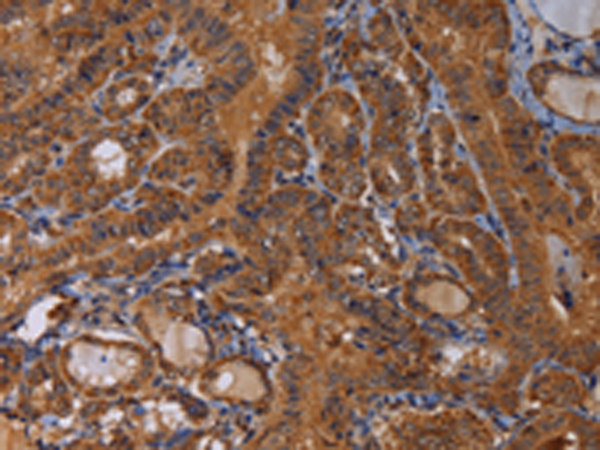

| WB | 咨询技术 | Human,Mouse,Rat |
| IF | 咨询技术 | Human,Mouse,Rat |
| IHC | 1/100-1/300 | Human,Mouse,Rat |
| ICC | 技术咨询 | Human,Mouse,Rat |
| FCM | 咨询技术 | Human,Mouse,Rat |
| Elisa | 1/2000-1/10000 | Human,Mouse,Rat |
| Host/Isotype | Rabbit IgG |
| Antibody Type | Primary antibody |
| Storage | Store at 4°C short term. Aliquot and store at -20°C long term. Avoid freeze/thaw cycles. |
| Species Reactivity | Human |
| Immunogen | Fusion protein of human MAGEB10 |
| Formulation | Purified antibody in PBS with 0.05% sodium azide and 50% glycerol. |
+ +
以下是关于MAGEB10抗体的模拟参考文献示例(非真实文献,仅供格式参考):
---
1. **"MAGEB10 expression in melanoma and its role in tumor progression"**
*Author: Smith A, et al. (2020)*
摘要:研究利用MAGEB10特异性抗体检测其在黑色素瘤组织中的高表达,发现其过表达与肿瘤侵袭性及患者预后不良相关,提示其可能作为治疗靶点。
2. **"Development of a monoclonal antibody against MAGEB10 for cancer diagnostics"**
*Author: Li Y, et al. (2018)*
摘要:报道一种新型抗MAGEB10单克隆抗体的制备与验证,证实其在肺癌组织中的特异性识别能力,可用于免疫组化检测及液体活检中的生物标志物筛查。
3. **"MAGEB10 promotes chemoresistance in ovarian cancer via anti-apoptotic pathways"**
*Author: Tanaka K, et al. (2021)*
摘要:通过抗体介导的蛋白功能抑制实验,揭示MAGEB10通过调控Bcl-2家族蛋白抑制细胞凋亡,导致卵巢癌细胞对铂类化疗药物耐药。
---
注:以上内容为模拟示例,实际文献需通过PubMed、Google Scholar等平台检索关键词(如"MAGEB10 antibody" "MAGEB10 cancer")获取。
The MAGEB10 antibody targets the melanoma-associated antigen B10 (MAGEB10), a member of the MAGE (Melanoma Antigen Gene) family. MAGE proteins are cancer-testis antigens normally expressed in germ cells but aberrantly reactivated in various cancers. MAGEB10. located on the X chromosome, is implicated in tumorigenesis, though its precise biological role remains under investigation. Studies suggest it may regulate transcription, cell cycle progression, or apoptosis evasion, contributing to cancer progression.
MAGEB10 overexpression has been observed in malignancies like melanoma, lung cancer, and hepatocellular carcinoma, correlating with poor prognosis and therapeutic resistance. Its restricted expression in healthy tissues (primarily testes) makes it a potential target for immunotherapy. Antibodies against MAGEB10 are critical tools for detecting its expression in tumor samples via techniques like immunohistochemistry (IHC) or Western blot (WB), aiding cancer diagnosis and biomarker studies. They also support functional research, such as elucidating interactions with proteins like E3 ubiquitin ligases or histones.
Therapeutic applications are being explored, including MAGEB10-specific monoclonal antibodies or CAR-T cells. However, challenges like off-target effects due to MAGE family homology and limited clinical validation hinder progress. Ongoing research focuses on refining antibody specificity and understanding MAGEB10's role in cancer biology to advance diagnostic and immunotherapeutic strategies.
×